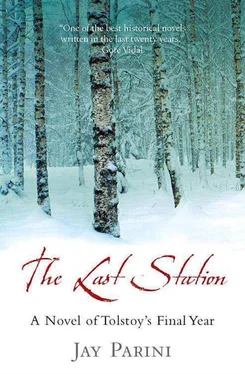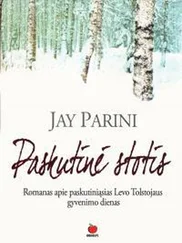‘Keep your coat on, Leo Nikolayevich,’ I said. ‘Even the sun is cold today.’
He grinned that toothless grin of his, stretching his lips. ‘You are my doctor, aren’t you?’
‘I am indeed. So listen, for once.’ I am forever trying to get him to behave sensibly about his age.
An official of the courts led us to a small box, where we sat on a wooden bench with other witnesses and official observers. The gallery was crowded, and the judge – an aristocrat and member of the local militia called Bozorev – bowed slightly to Leo Nikolayevich as he entered and took his place behind a table.
The first session concerned the muzhiks who stole the mail. Leo Nikolayevich believed the peasants had been framed, and I communicated this information to the judge. Leo Nikolayevich patted his knees with his long fingers, as if keeping time with a private melody. He seemed lost through much of the proceedings. But he came to life during the testimony against Afanasev, who belonged to a fringe group of socialists and revolutionaries. An oxlike prosecutor in a regimental uniform accused Afanasev of circulating materials designed to create discontent among the muzhiks. Afanasev was not directly accused of plotting to overthrow the government of the tsar, but the implications were grave. Those wishing to speak in his behalf, such as Leo Nikolayevich, were slated for the afternoon session.
We had lunch in a bare little room next to the courts, a piece of rough brown bread and a slice of goat cheese drunk with hot tea brought by a vendor. As we talked about the proceedings, Leo Nikolayevich grew animated. He believed in the elementary principles of free speech, he said, principles quite alien to the Imperial government of Russia. He admired Afanasev, who is young and idealistic. Indeed, he sympathized with the young man’s goals, though he doubted that violent revolutions would ever lead to the establishment of a just society.
‘People seem to forget that we all must die,’ he said. His hand trembled as he tore off a small bit of bread to mouth slowly with his gums. ‘We ought to spend our energies not on useless conflicts but on doing what is clearly good. If a revolution is not something genuinely new – such as the abolition of all government – it will certainly be nothing more than an imitation of what we have already seen, and that will be worse than what it replaces.’
I did not find this entirely sound. ‘But the tsar is wicked,’ I said, whispering, even though we seemed alone. ‘Any government would be better than this one. Surely none could be worse.’
Leo Nikolayevich spoke calmly, unafraid of being overheard. He is among the few Russians who can be said to have immunity from prosecution by the tsar. ‘There can be no improvement in the condition of the Russian people,’ he said, ‘nor any people, through revolution that does not exist on a moral basis. A moral basis presuppose that force will not be used.’
I quickly got all this down on my notepad. It was good. Very good. But I objected to the impracticality of his stance. I, too, believed that the will of God must be followed in all things and that immoral revolutions could only hurt the Russian people. But I saw no reason why it could not be God’s will that a reasonable form of government forcibly replace a tyrannical one. I expressed these reservations, but Leo Nikolayevich seemed immovable. Perhaps he was putting himself in a mood appropriate to the afternoon session.
We got back to the chambers before the rest of them; it was even colder now. Leo Nikolayevich hunched forward, working his mouth as though lumps of bread were still lodged in his cheeks and needed mastication. He gasped once or twice, and I quickly took his pulse. It was racing madly. I urged him to return immediately to Yasnaya Polyana.
‘I will not speak,’ he said. ‘But you must stand in my place. Say that I disagree with all that has been said against Afanasev. Tell them that I consider him a young man of high ideals and goodwill, and that he should not be punished.’
When the judge returned, I stood to apologize for Leo Nikolayevich, saying that his health made it impossible for him to speak in public. But I communicated, briefly, his position with regard to Afanasev, and the judge thanked us warmly. At this point, Leo Nikolayevich stood, bowed to the judge and the assembly, and left the courtroom, leaning heavily on my arm for support.
Not a sound could be heard as we left, not until a voice lifted, lonely as a puff of smoke on the horizon: ‘God save Leo Nikolayevich!’ I looked back. It was Afanasev.
We stopped for another glass of tea on the way out, since Leo Nikolayevich felt a chill. We had not been sitting there terribly long when a young man appeared. He had a message for the count, he said, smiling at me as though we shared some intimacy. He said, ‘I have been asked to report that the case against the muzhiks has been dismissed. They are free to go home.’ He paused, letting the richness of that news sink in. ‘And Afanasev has been given the minimum sentence. Three years confinement in a fortress.’
‘That’s horrid!’
‘Dushan Petrovich,’ Leo Nikolayevich said. ‘We should be glad he was not condemned to death, given the unrest throughout this country. The government is only too eager to see that examples are made of men like Afanasev. Three years in a fortress is not so bad for a young man. He will read and write. I will send him books.’
Leo Nikolayevich was aglow in the evening, kindly to everyone, listening attentively to Sofya Andreyevna. He put a drop of white wine in his water goblet – a sign that he was feeling festive.
Boulanger was there, playing (insufferably) the good little disciple, as was Nazhivin, a young writer, who insisted on sitting next to ‘the Master,’ as he called him – to everyone’s chagrin. He cooed like a pigeon when Leo Nikolayevich spoke, his throat clucking away. I disliked him intensely, especially when he grew philosophical and repeated, verbatim, Leo Nikolayevich’s own remarks, as though he’d just thought of them himself. Leo Nikolayevich remained polite with him. I can’t think why. Indeed, he nodded vigorously when Nazhivin parroted a particularly well-known Tolstoyan locution. It was most embarrassing.
Sofya Andreyevna ushered everyone into the drawing room at the front of the house, and we sat about while she played Beethoven’s Pastoral Sonata on the piano. Large tears came to Leo Nikolayevich’s eyes, and he wiped them on his sleeve. He often weeps when music is played, either on the piano (usually by Sofya Andreyevna, who fancies herself a world-class pianist whom circumstances have forced to hide her light under a bushel) or on the gramophone. On the other hand, music moves me not a whit.
It has been ruined for me by Goldenweiser, the idiot Jew. Night after night he performs at the keyboard for the Tolstoy family, who are too kindly to turn him out. Leo Nikolayevich is pushed about, submissive to all, eager to preserve the calm at any cost. But the cost is great.
One day he will understand why I oppose Goldenweiser. He will also understand that Sofya Andreyevna must be removed.
Most days resemble other days. They fall in rows, mowed down by time. One does not much regret the loss. But a few glorious days stand out in memory, days where each moment shines separately, like cobbles on a strand. One yearns to repossess them, and mourns their distance. Such was my first day as Leo Nikolayevich’s secretary.
It was mid-January, a foggy morning, exceedingly warm for this time of year in Russia. I woke early in the small room just above the kitchen. This was my second day at Telyatinki, and I was to meet with Tolstoy after breakfast. Masha, who had recently joined the devout band of Tolstoyans who live and work at Chertkov’s house, brought me a glass of tea in bed. She is a tall girl, Finnish in appearance, with high cheekbones and short blond hair that falls straight on either side of her head. Her almond-shaped, green eyes dipped to the floor when she entered my room, having knocked so lightly that I was unaware of her presence till she opened the door.
Читать дальше












